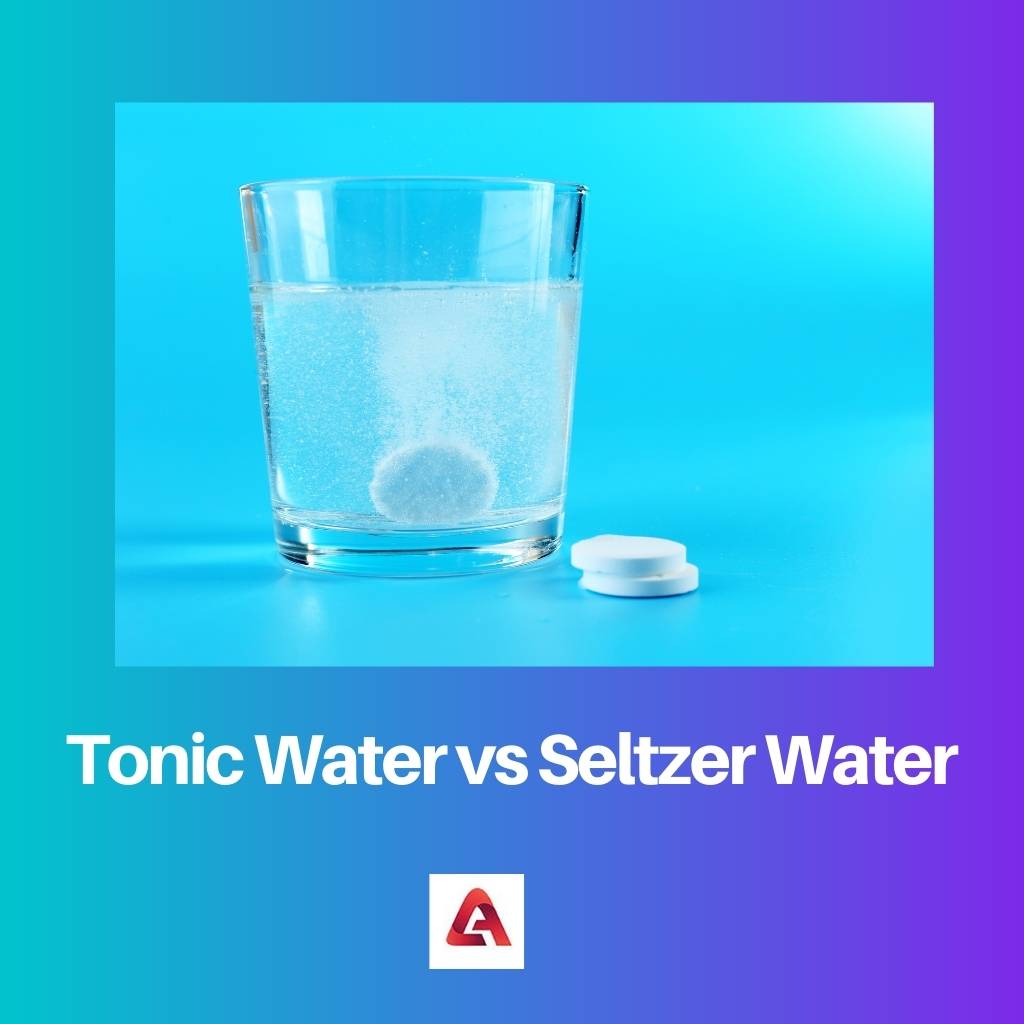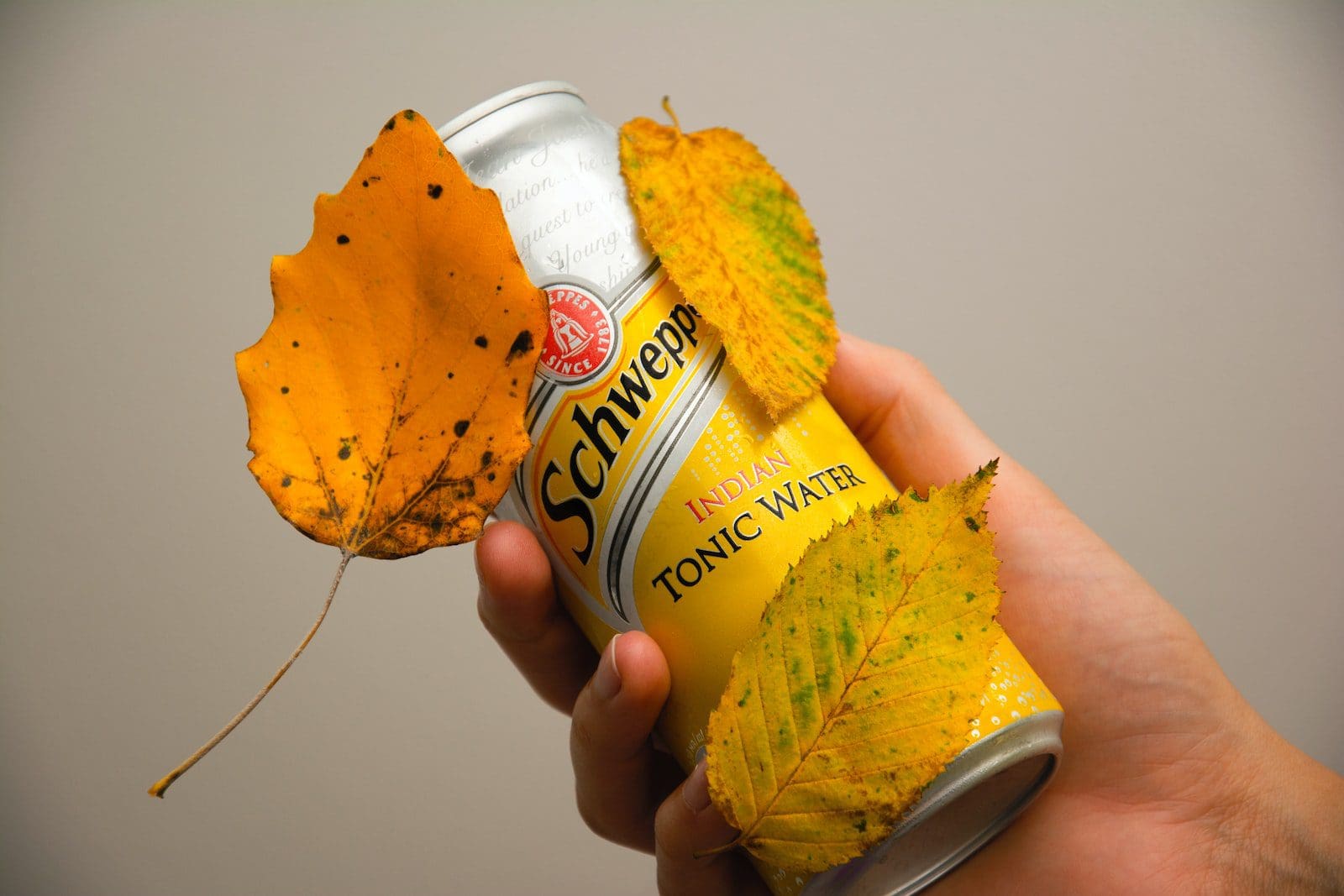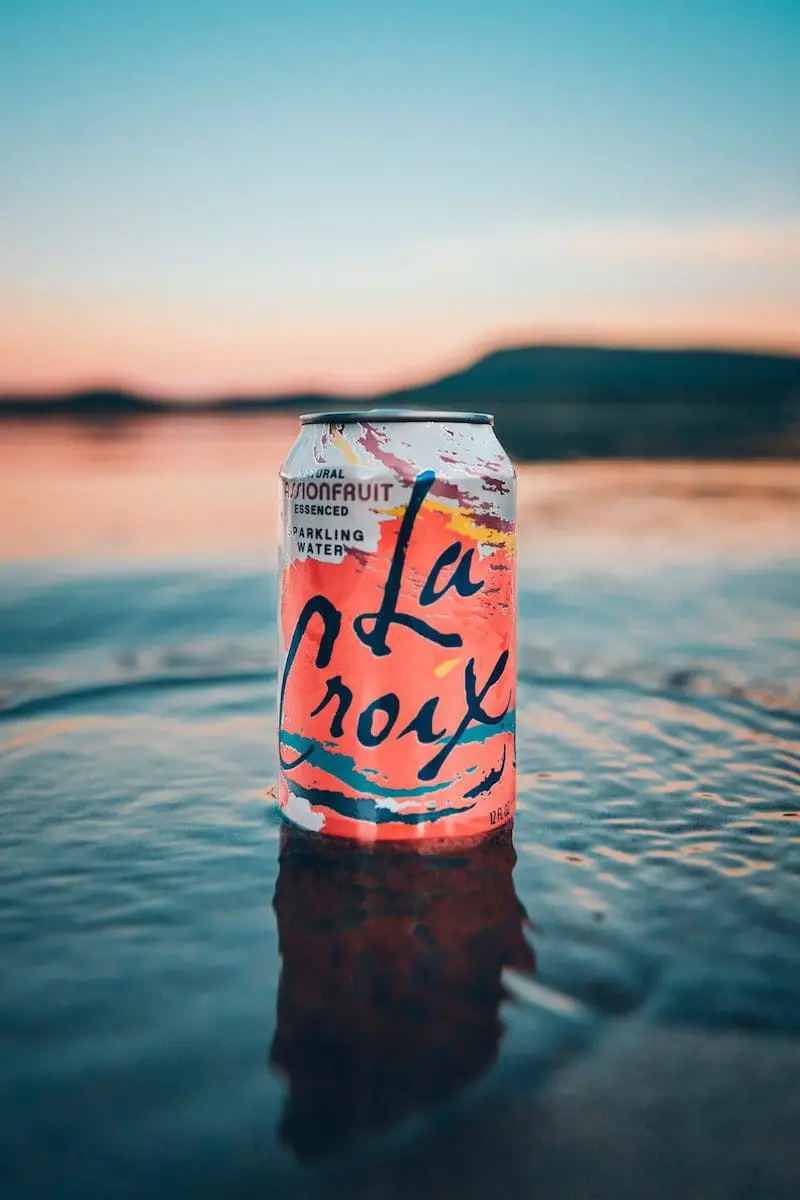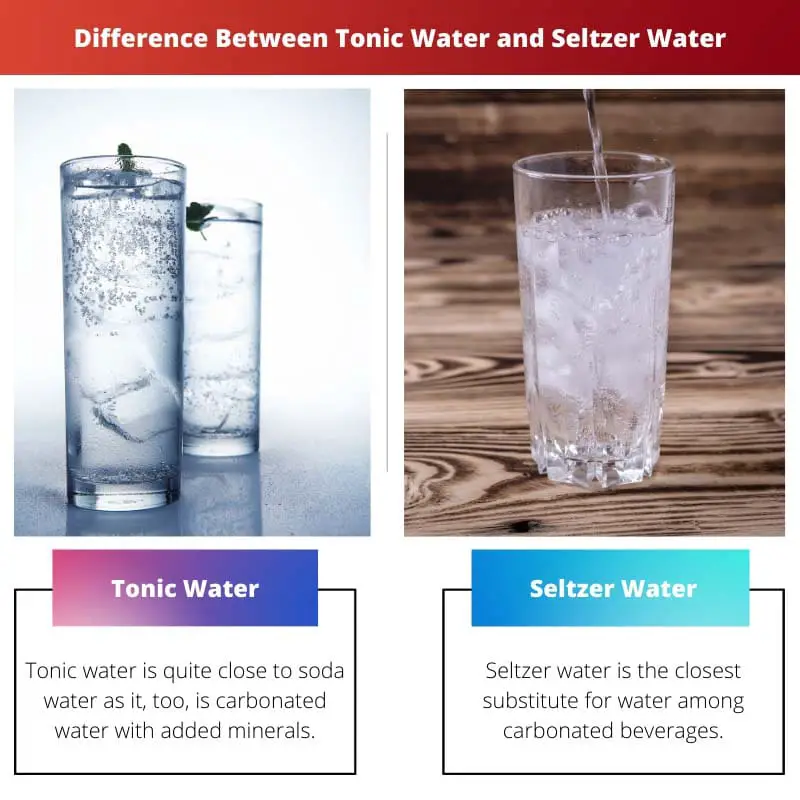If it is interesting, it has your attention. This growing fascination for things to be interesting has inspired people to venture into the unknown.
Even plain drinking water is steadily being replaced with something interesting- delightful effervescent drinks! With a boom in the popularity of carbonated drinks, we must familiarize ourselves with its various types.
Tonic water and seltzer water are two types of carbonated drinks that are in high demand now.
Key Takeaways
- Tonic water contains quinine, giving it a distinct bitter taste, while seltzer water is plain carbonated water without added flavorings.
- Tonic water is commonly used as a mixer for alcoholic drinks like gin and tonic, while seltzer water is used as a refreshing beverage or as a mixer in cocktails.
- Tonic water is considered a healthier alternative to regular soda due to its lower sugar content, while seltzer water is calorie-free and contains no sugar or additives.
Tonic Water vs Seltzer Water
Tonic water contains quinine, a bitter alkaloid compound that gives it a distinct bitter taste, used as a mixer for gin and tonic, but can also be enjoyed on its own. Seltzer water is simply carbonated water with no added ingredients, used as a replacement for still water in recipes.

Tonic water is a carbonated drink that is prepared after adding carbon dioxide in plain water along with quinine (a compound extracted from the bark of a cinchona tree) and is sweetened with artificial sweetener, sugar, or high fructose corn syrup.
It is the quinine that gives tonic water a bitter taste. The sweeteners are added to sweeten it and improve the taste.
Seltzer water is plain water that has been carbonated. It does not contain added minerals and, therefore, tastes a lot like water. Its flavourless taste makes it ideal to be used in drinks as well as certain food recipes. However, seltzer water is also available in citrus flavours.
Comparison Table
| Parameters of Comparison | Tonic Water | Seltzer Water |
|---|---|---|
| Land of Origin | British India (however, the cinchona tree originated in the Peruvian Andes) | Selters (a town in Germany) |
| Ingredients Used | Plain water, carbon dioxide, quinine, and sweeteners | Plain water and carbon dioxide |
| Taste | It tastes bitter due to the quinine but it is sweetened with additive contents | Tastes plain but feels fizzy due to the added carbon dioxide |
| Calories | Contains calories | Zero calories |
| Used as | It was initially used as a treatment for malaria, but now, is used for making cocktails | Is used for regular drinking purposes and to prepare cocktails |
What is Tonic Water?
Tonic water is quite close to soda water as it, too, is carbonated water with added minerals. But what sets aside tonic water from other carbonated beverages is its distinctive bitter flavour that comes from quinine (a compound extracted from the bark of a cinchona tree).
Cinchona originally originated in the Peruvian Andes, South America, but tonic water originates from British India. It was used to treat malaria and quinine was known as a cure to malaria.
Tonic water used to be very bitter due to the quinine content, but now, manufacturers add high fructose corn syrup, sugar, or artificial sweeteners like saccharin, sucralose, or aspartame, to lessen the bitterness.
Since tonic water is sweetened, it is high in calorie content. 12 ounces or 355ml of tonic water contains 121 calories and 31.4 g of carbohydrates and sugar each. It also contains a few nutrients in a very small amount- 3% of the Daily Value (DV) of Zinc and 2% of the DV of Sodium and Copper each.
Its high sugar content makes it less ideal as a choice for regular hydration purposes.
Tonic water is ideally paired with gin and tonic and is used vastly as a mixer in cocktails.

What is Seltzer Water?
Seltzer water is the closest substitute for water among carbonated beverages. It is bubbly because of the addition of carbon dioxide.
Seltzer water gets its name from its town of origin, Selters in Germany. This town was famous for bottling and selling naturally occurring carbonated water. Its flavourless taste made it the most opted drink after water. The European immigrants brought seltzer water with them to America.
Since it has a neutral taste, it is used for purposes of regular consumption, to mix with cocktails, or to add to food recipes. It is also a key ingredient in chia-infused energy drinks, fluffy pancakes, softer pizza bases, bubbly iced tea and coffee, homemade sodas and desserts, etc.
A cup of seltzer water contains zero calories. However, citrus-flavoured seltzer water may contain additional minerals.
For those who are health conscious, seltzer water offers a refreshing yet healthy break from water. Studies have found that it is as hydrating as water and soothes stomach problems such as constipation, pain, or irregular bowel movement. Compared to other fizzy drinks, seltzer water barely does any damage to the teeth and gums.
The increasing popularity of seltzer water is one reason why restaurants, bars, and hotels are installing commercial seltzer machines.

Main Differences Between Tonic Water and Seltzer Water
- While tonic water is a combination of plain water, carbon dioxide, and quinine with added sweeteners, seltzer water is plain water with carbon dioxide injected into it.
- Tonic water is closer to soda water as both contain added minerals and nutrients. In contrast, seltzer water tastes just like water but is fizzy due to the carbon dioxide.
- 355 ml of tonic water contains 121 calories and is high in sugar and carbohydrate content, whereas 355 ml of seltzer water has zero calories.
- At present day, tonic water is used as a mixer in cocktails, whereas, due to seltzer water’s neutral taste, its use is not only limited to as a mixer in cocktails but is also used in making mocktails, desserts, fluffy pancakes, bubbly iced tea and coffee, and soft pizza bases.
- While there is a high chance that regular consumption of tonic water can lead to obesity or diabetes, seltzer water does not have calories and is not harmful to the body. Furthermore, seltzer water can prove to be very helpful if one is suffering from stomach pain, constipation, or indigestion.

- https://www.sciencedirect.com/science/article/abs/pii/S0278691503001121
- https://www.proquest.com/openview/120b3408e43e9432b2dd1eaacb6dad1f/1?pq-origsite=gscholar&cbl=48850

The historical significance of quinine in tonic water and the origin of seltzer water from Germany adds depth to the understanding of these beverages. The article’s focus on historical and geographical aspects is compelling.
I appreciate the emphasis on the cultural background of these carbonated drinks. It enriches the experience of learning about tonic water and seltzer water.
Absolutely, the cultural and geographical contexts provided in the article enhance the overall understanding of tonic water and seltzer water. It’s captivating to learn about their roots.
The nutritional breakdown of tonic water and seltzer water offers a comprehensive understanding of the differences in their caloric content and nutrient composition. It’s valuable information for those interested in their health implications.
The detailed nutritional analysis of tonic water and seltzer water provides a nuanced understanding of their respective health impacts. This article offers a thorough exploration of their nutritional aspects.
The emphasis on the nutritional aspects of both tonic water and seltzer water provides valuable insights into their health implications. It’s an informative piece that contributes to a deeper understanding of these beverages.
The detailed comparison of the taste, calories, and usage of tonic water and seltzer water is enlightening. It helps in making more informed choices about these carbonated beverages.
I found the nutritional information particularly interesting. The differences in calorie content and nutrients between tonic water and seltzer water are quite significant.
The section on the uses of seltzer water in various recipes and drinks demonstrates its versatility. This article provides valuable insights into the practical applications of seltzer water.
This article provides a comprehensive comparison between tonic and seltzer water, covering their origins, ingredients, taste, and usage. It is quite interesting to note their differences and similarities.
Yes, it’s fascinating to learn about the history behind tonic and seltzer water, and their different characteristics. The information provided here is valuable and informative.
I appreciate the detailed comparison table that highlights the specific parameters of comparison between tonic and seltzer water. It makes it easier to understand the differences in a concise manner.
The article offers a compelling analysis of the distinctive characteristics of tonic water and seltzer water, providing a nuanced understanding of their unique qualities. It’s a fascinating exploration of these carbonated beverages.
The description of the preparation and ingredients of tonic water and seltzer water provides a comprehensive understanding of their composition. It’s intriguing to learn about the detailed process of their creation.
The detailed explanation of the ingredients used in tonic water and seltzer water is particularly engaging. This article presents a compelling analysis of their composition.
The insight into the methods of preparation for both tonic water and seltzer water is enlightening. It helps in appreciating the craftsmanship involved in creating these beverages.
The article does an excellent job of explaining the origins and composition of tonic water and seltzer water. It’s intriguing to know about the historical background of these popular carbonated drinks.
Agreed, the historical context provided for both tonic water and seltzer water gives a deeper understanding of their significance. It’s a fascinating read.
The detailed explanation of the historical background and geographical origins of tonic water and seltzer water adds depth to the understanding of these beverages. This article presents a valuable perspective on their cultural significance.
I agree, the article’s focus on the historical and cultural contexts of tonic water and seltzer water provides a well-rounded view of their significance. It’s an insightful analysis.
The comparison table effectively summarizes the key differences between tonic water and seltzer water, making it easier to comprehend their unique characteristics. The article’s presentation is both informative and accessible.
The clarity of information provided, especially in the comparison table, makes it a valuable resource for understanding the differences between tonic water and seltzer water.
I found the comparison table to be quite helpful in understanding the primary distinctions between tonic water and seltzer water. It offers a clear and concise overview of their attributes.
The distinction made between tonic water and seltzer water in terms of ingredients, taste, and caloric content is thoroughly explained. This information is beneficial for those seeking a deeper understanding of these beverages.
I agree, the clear comparison of the nutritional aspects of both tonic water and seltzer water offers an insightful perspective. The detailed breakdown of calorie and nutrient content is quite informative.